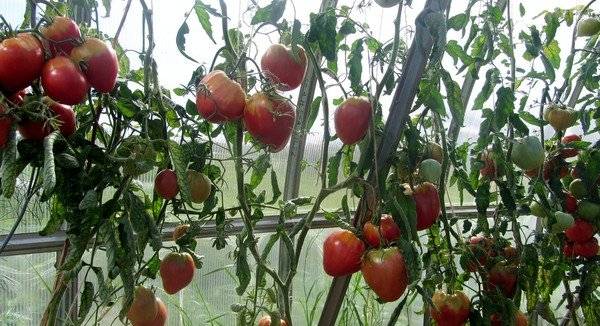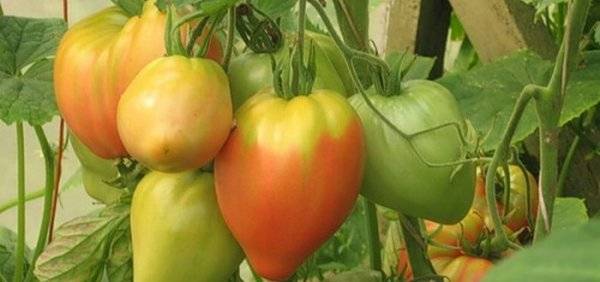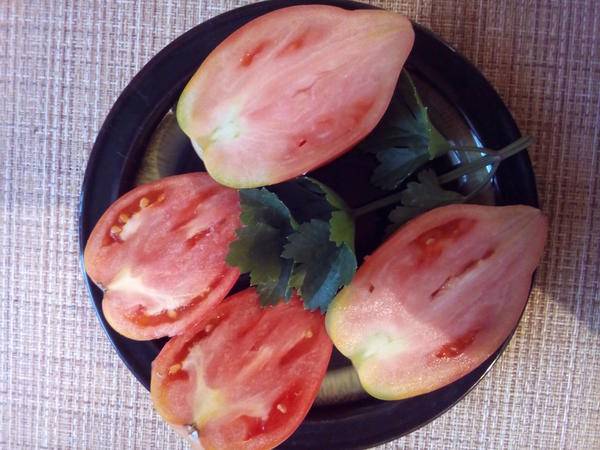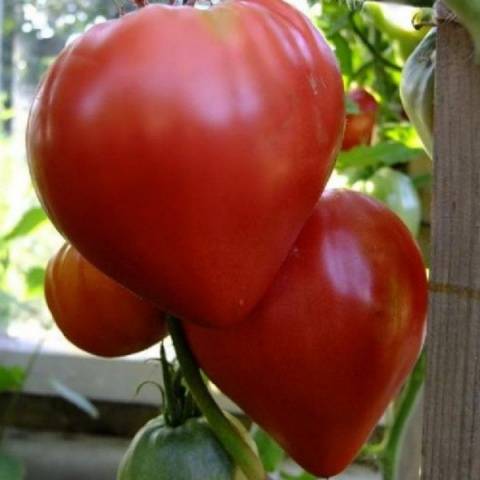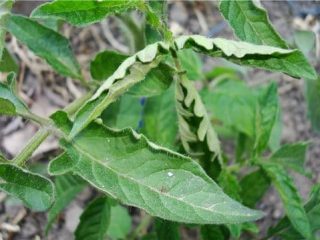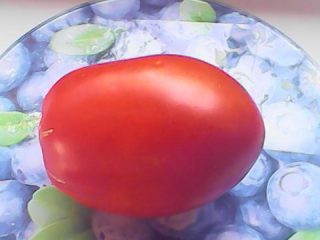Content
Many gardeners prefer to grow varieties of large-fruited tomatoes. One of them is the Eagle Heart tomato. Pink tomatoes, distinguished by excellent taste, large fruits, are winning more and more hearts. One tomato is enough for a salad for a whole family. The fruits are used most often for these purposes.
Pink-cheeked tomatoes can be canned, only containers with a wide neck are required. And what an amazingly thick and tasty tomato juice is obtained from the Eagle Heart tomatoes! Any housewife will find use for large and fragrant fruits.
Description of the variety
To understand what the Eagle Heart tomato is, you need a characteristic and description of the variety. We will share this information with our readers.
Description of the bush
Tomato belongs to the mid-season indeterminate varieties with unlimited growth. The height of plants in greenhouse conditions reaches 180 cm. When grown outdoors, a little lower.
The Eagle Heart tomato, as can be seen in the photo, has a powerful, thick stem with a large number of medium light green leaf blades.
The tomato throws out peduncles with whitish-yellow nondescript flowers. A simple brush usually has up to 7 flowers. The first brush on tomatoes of this variety appears above the seventh leaf, then every two. Moreover, not all flowers will become fruits. It's all about the large size of the Eagle Heart tomato. Most often 3-4 tomatoes hang on the brushes. On the first brushes, there is a little more (see photo).
Features of the fruit
Fruits are large in size, sometimes up to 800-1000 grams (on the lower inflorescences). Tomatoes resemble a rounded heart in shape, for which they got their name. The tip of the pink-scarlet fruit is slightly elongated.
Tomato Eagle Heart, according to the description, reviews of gardeners and consumers, is distinguished by fleshy pulp, sugary at the break. The fruits are juicy, there are few seed chambers.
Although tomatoes have a tough skin that prevents cracking, they are not rough. The taste of tomatoes of the Eagle Heart variety is rich, truly tomato, in the fruits there is more sugar than acid.
Characteristics
To appreciate the Eagle Heart tomatoes at their true worth, let's dwell on the characteristics. Like any plant, this variety has its advantages and disadvantages.
Benefits
- The tomatoes are mid-ripening, the fruiting is extended, which is very convenient. The first fruits ripen in the greenhouse earlier than other varieties.
- Judging by the description, reviews of gardeners, posted photos, the yield of the Eagle Heart tomato is excellent. As a rule, from 8 to 13 kg of tasty large fruits are harvested from a square meter. It should be borne in mind that only 2 bushes are planted on the square. Subject to all standards of agricultural technology and proper care, the tomato yield can be even higher.
- The fruits are perfectly transported, do not crack due to the dense skin.
- Tomatoes retain their presentation and taste for more than 3 months.
- The variety is resistant to many diseases of nightshade crops, in particular, to late blight, gray and brown rot, mosaics and Alternaria.
- Tomatoes tolerate well, practically without loss of yield, temperature fluctuations.
- Since this is a variety and not a hybrid, you can get your own seeds.
disadvantages
Not to say that the Eagle Heart tomato variety has some drawbacks, it would be dishonest in relation to gardeners. Although there are not so many of them, we will not be silent:
- Growing tomatoes of this variety requires a nutritious soil.
- Tall and highly leafy tomatoes must be pinned and tied up throughout the growing season.
Most likely, it is difficult for beginners to deal with this tomato variety if there is not enough knowledge of agricultural technology and caring for nightshade crops.
Growing and care
Tomatoes Eagle heart, judging by the description and characteristics, the mid-ripening period. That is why you need to get good seedlings to get a decent harvest.
How to grow seedlings
Getting tomato seedlings is a long-lasting and laborious process. The fact is that the seeds need to be sown 60 days before planting in a permanent place in a greenhouse or open ground. Experienced gardeners sow seeds in the last decade of March or the first week of April. Tomatoes from the first days of life must grow in special conditions.
Seeding tanks and soil
The Eagle Heart tomato prefers fertile, light, breathable soil. You can use ready-made soils for sowing, specially designed for growing vegetables. But many gardeners prepare the soil on their own. In this case, in addition to sod land, humus or compost (peat), add wood ash. This is not only nutrition, but also the prevention of tomato black leg disease.
As planting containers, boxes with sides of at least 6 cm or containers are used. They, like the soil, must be treated with boiling water, dissolving several crystals of potassium permanganate. Boric acid can also be used.
Cooking seeds
- Substandard tomato seeds are often sold, so germination is poor. In order not to waste time, it is advisable to check the seed. For this, a 5% salt solution is diluted and seeds are dipped into it. The puny, immature specimens will float up. The remaining seeds (at the bottom) are washed in clean water.
- They can then be processed in fresh aloe juice or pink potassium permanganate solution. If you have growth stimulants, then you need to soak the seed for half a day in this solution.
- The processed seeds are dried until flowable.
Sowing and caring for seedlings
- In the ground, grooves are made at a distance of 3 cm, in which tomato seeds are spread in increments of 2 to 3 cm. Embedding to a depth of no more than 1 cm. The containers should be placed in a bright and warm, up to +25 degrees, place.
- With the appearance of the first sprouts, the air temperature is slightly reduced so that small tomatoes do not stretch. At night up to 10 degrees, in the daytime - no more than 15 degrees. But the lighting should be excellent throughout the entire growing period of the seedlings. Watering tomato seedlings of this variety should be moderately as the top clod of earth dries up.
- When 2-3 true leaves appear on the Eagle Heart tomatoes, a pick is made. It is necessary for the growth of a powerful root system by tomatoes. Nutrient soil is poured into separate containers and treated in the same way as before sowing seeds.
Care in permanent soil
Tomatoes are transplanted to a permanent place in late May or early June, depending on the climatic characteristics of the region. The land is prepared in advance in a greenhouse or open ground. The wells are poured with boiling water with potassium permanganate, complex fertilizers are added.
Form the tomatoes into 1 or 2 stems. Immediately after planting, they are tied to a reliable support. In the future, the procedure is repeated many times as the bush grows. Subsequently, heavy brushes will have to be tied up.
Further care of the variety consists in watering, feeding. As a rule, complex mineral fertilizers are used for feeding tomatoes, as well as infusion of mullein, chicken droppings, or green fertilizer from mown grasses.
Watering tomatoes of the Eagle Heart variety is necessary with warm water so that the plants do not slow down their growth and do not lose their ovaries. Collect the fruits of the tomatoes as they ripen. It is not necessary to wait for complete redness: brown fruits ripen perfectly.
Diseases
As follows from the characteristics and descriptions of the Eagle Heart tomato variety, the plants are resistant to many diseases. But preventive measures should not be neglected. You need to start work already in the pre-sowing period when processing soil and seeds.
At the seedling stage and with further care, tomato bushes are sprayed with Fitosporin, a light solution of potassium permanganate, iodine, or preparations containing copper. Such measures prevent the appearance of late blight, fusarium wilting and other diseases inherent in nightshade crops.
Not only tomatoes Eagle heart attracts gardeners, but also the variety Eagle beak:
